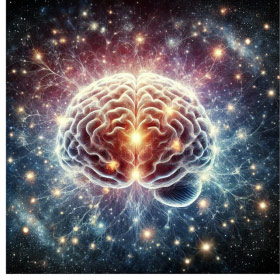Introduction
During my second year of medical school, we were introduced to the study of the human brain. I had the privilege of dissecting a cadaveric brain to understand the anatomy of this incredible structure. The focus then was to study the structure and function of the brain to get through the exams.
However, I was fascinated by the human brain and kept my interest in learning about it.
 The human brain is widely regarded as the most complex object in the universe. It comprises over 86 billion neurons and trillions of synapses, creating an intricate network that facilitates thought, memory, emotion, and bodily function. This complexity extends beyond the number of neurons to the connectivity between them. The brain’s ‘connectome’, a comprehensive map of these neural connections, surpasses the number of stars in the galaxy. Each neuron can form thousands of connections, resulting in trillions of pathways, underpinning the brain’s adaptability and functionality.
The human brain is widely regarded as the most complex object in the universe. It comprises over 86 billion neurons and trillions of synapses, creating an intricate network that facilitates thought, memory, emotion, and bodily function. This complexity extends beyond the number of neurons to the connectivity between them. The brain’s ‘connectome’, a comprehensive map of these neural connections, surpasses the number of stars in the galaxy. Each neuron can form thousands of connections, resulting in trillions of pathways, underpinning the brain’s adaptability and functionality.
One of the brain’s most remarkable features is its adaptability, known as neuroplasticity. This ability to reorganise and form new connections in response to experiences, learning, or injury is a testament to the brain’s resilience. It allows humans to adapt to new environments, acquire languages, and recover from trauma. Unlike most biological organs, the brain actively rewires itself, enabling lifelong learning and adaptation while maintaining coherence and function.
The brain’s processing power is unparalleled, and it’s also incredibly efficient. It is capable of handling complex, simultaneous data streams with remarkable efficiency using only 20 watts of energy. Unlike linear computational systems, the brain synthesises information creatively, enabling pattern recognition, memory formation, and predictive modelling—tasks that computers struggle to replicate.
Advances in neuroscience have deepened our understanding of the brain and inspired the development of new technologies. Our growing knowledge of the brain has influenced fields like artificial intelligence, bioengineering, and brain-machine interfaces. Technologies like neural prosthetics and memory-enhancing devices show promise for aiding individuals with disabilities, and the future holds even more potential for innovations that could replicate the full abilities of the brain.
Despite these advances, much about the brain remains unknown. Its adaptability, role in generating consciousness, and capacity for creativity highlight its extraordinary complexity. The more we learn, the more its mysteries deepen. These mysteries include the exact mechanisms of memory formation, the nature of consciousness, and the potential for enhancing cognitive abilities. This ongoing exploration solidifies the brain’s reputation as the most remarkable structure in the universe.




